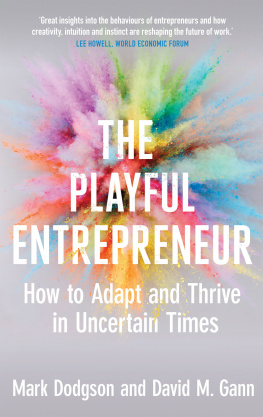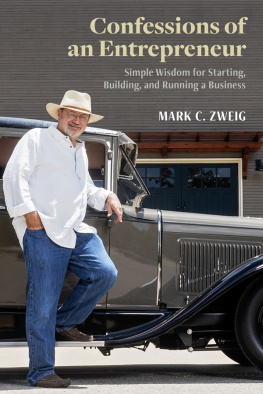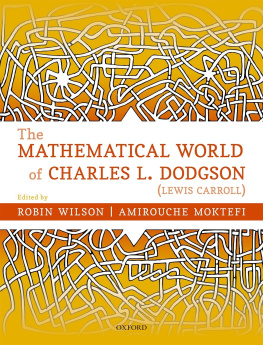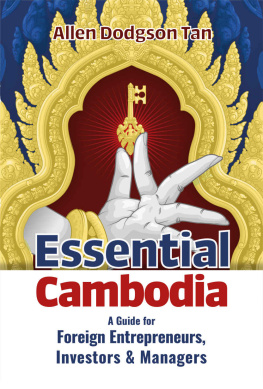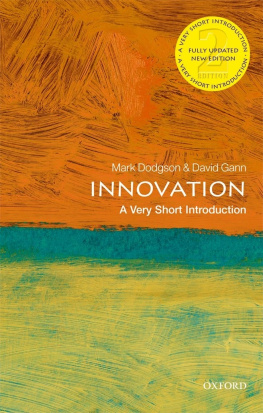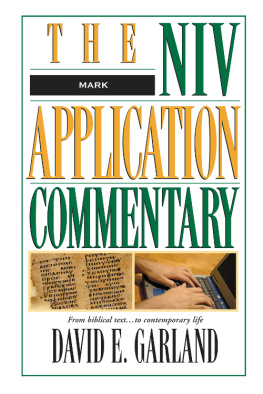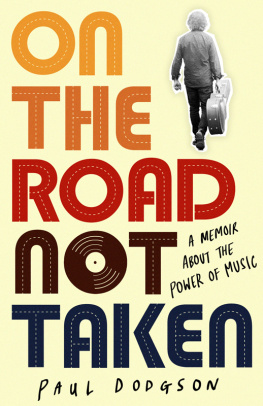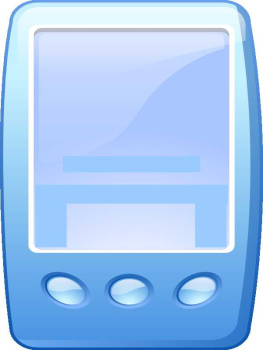Mark Dodgson - The Playful Entrepreneur
Here you can read online Mark Dodgson - The Playful Entrepreneur full text of the book (entire story) in english for free. Download pdf and epub, get meaning, cover and reviews about this ebook. publisher: Yale University Press, genre: Home and family. Description of the work, (preface) as well as reviews are available. Best literature library LitArk.com created for fans of good reading and offers a wide selection of genres:
Romance novel
Science fiction
Adventure
Detective
Science
History
Home and family
Prose
Art
Politics
Computer
Non-fiction
Religion
Business
Children
Humor
Choose a favorite category and find really read worthwhile books. Enjoy immersion in the world of imagination, feel the emotions of the characters or learn something new for yourself, make an fascinating discovery.
- Book:The Playful Entrepreneur
- Author:
- Publisher:Yale University Press
- Genre:
- Rating:4 / 5
- Favourites:Add to favourites
- Your mark:
- 80
- 1
- 2
- 3
- 4
- 5
The Playful Entrepreneur: summary, description and annotation
We offer to read an annotation, description, summary or preface (depends on what the author of the book "The Playful Entrepreneur" wrote himself). If you haven't found the necessary information about the book — write in the comments, we will try to find it.
The Playful Entrepreneur — read online for free the complete book (whole text) full work
Below is the text of the book, divided by pages. System saving the place of the last page read, allows you to conveniently read the book "The Playful Entrepreneur" online for free, without having to search again every time where you left off. Put a bookmark, and you can go to the page where you finished reading at any time.
Font size:
Interval:
Bookmark:
THE PLAYFUL ENTREPRENEUR

Copyright 2018 Mark Dodgson and David M. Gann
All rights reserved. This book may not be reproduced in whole or in part, in any form (beyond that copying permitted by Sections 107 and 108 of the U.S. Copyright Law and except by reviewers for the public press) without written permission from the publishers.
For information about this and other Yale University Press publications, please contact:
U.S. Office:
Europe Office:
Set in Adobe Caslon Pro by IDSUK (DataConnection) Ltd
Printed in Great Britain by TJ International Ltd, Padstow, Cornwall
Library of Congress Control Number: 2018938631
ISBN 978-0-300-23392-6 (hbk)
A catalogue record for this book is available from the British Library.
10 9 8 7 6 5 4 3 2 1
For Oliver and Michael
Contents
Prelude
In 1762, the Swiss philosopher Jean-Jacques Rousseau wrote an influential book called Emile. The book was stylistically rather strange and, as we shall see, was written by an extremely peculiar man. Some of the views in the book were so subversive it was banned and even publicly burned. Its ambitions were no less than understanding the nature of mankind, and how education can encourage innate human goodness.
The eponymous Emile is an imaginary child, and Rousseau writes about how early education should encourage his ability to carefully observe the world around him. Having made an active and thinking being, the latter part of Emiles education is completed by making a loving and feeling being that is to say, to perfect reason by sentiment. A key to Emiles learning, which we call Emiles gift, is the way he combines his work and his play.
Work or play are all one to [Emile], his games are his work; he knows no difference. He brings to everything the cheerfulness of interest, the charm of freedom.
The gift of combining work and play is the core of this book. The wide range of entrepreneurial people and organizations whose stories we tell show the importance of merging play and work in todays uncertain world. They show us the behaviours of entrepreneurs that allow everyone at work to express the cheerfulness of interest and enjoy the charm of freedom. With so many people working in circumstances that are volatile, stressful and unrewarding and where new technologies can seem so threatening new approaches to work are needed that bring the pleasure, fun and meaning back to this important aspect of our lives. Emiles gift is to show us the virtue of playful work and how its helps us survive and thrive in our jobs in a turbulent and unpredictable world.
Acknowledgements
We have worked together for nearly thirty years, researching and teaching and writing numerous books and articles. We have argued a lot, learned much from each other, and have had tremendous fun. In short, we have collaborated productively and happily through what shall be described in this book as play. That play has had serious intent were both very clear about what needs to be done to succeed in our careers and have often been single-minded in their pursuit and it has been energizing and hugely enjoyable. We laugh a lot: mainly at each other.
Trying to understand play has taken up a fair proportion of our thinking time the last decade or so, and it has been a fortunate privilege because it has allowed us to research some amazing and inspiring people and organizations. Were very glad we didnt choose to study misery.
As well as the immense debt we owe to the people we interviewed for the book, we have also benefited enormously from discussions and feedback from colleagues and friends. Our deepest thanks are accorded to: Gerry George, Nelson Phillips, Martin Wardrop, Jonathan Weber, Geoff Garrett, Jack Dodgson, Amy LEstrange, Tim Kastelle, Philip Pullman, Martie-Louise Verreynne, Robert Skidelsky, Paul McDonald, Kirstin Ferguson, John Bessant, Nancy Pachana, Kate Dodgson, Kristien de Wolf, Sheridan Ash, Andrew Scheuber, Mike Steep, Irving Wladawsky-Berger and Leslie Butterfield. Rosie Dodgson showed us how to combine one of the at once most playful and responsible jobs in the world, operating the bungee jump in Queenstown, New Zealand.
Our great thanks go to Tim Brown and Dave Webster and the people at IDEO for giving us a wonderful week.
Some have progressed beyond the call of duty and have read a draft of the book in its entirety. We especially acknowledge Anne Asha, Maryam Philpott, Diane Moody, Jeff Rodriguez, Anna Krzeminska, Peter Childs and James Stanfield. In the spirit of playfulness, all shortcomings in the book are entirely their responsibility.
We are grateful to our employer institutions University of Queensland and Imperial College London for providing the environment within which we and our colleagues can play with ideas and the time and space to think and reflect on them.
Thank you, Paddy ORourke, for showing us what it is to be noble.
Our gratitude goes to our agent, Maggie Hanbury, for her good judgement and perseverance.
Our greatest debt is to Sheridan and Anne for all their grace and fortitude.
PART 1
Why be playful?
Work
Work helps give life purpose. As well as providing the means to pay our way in the world, it is through work that we express our personality, engage constructively with others and contribute to the communities of which we are a part. What work we do and how we do it helps define our society, the organizations to which we devote our efforts and our roles and identity as individuals. The purposeful effort of work is one of the most rewarding, meaningful and time-consuming activities in all our lives.
More than ever before, work is surrounded by opportunity and besieged by uncertainty. People are working hard, putting in long hours, but see few non-pecuniary returns and more and more stress. Secure, full-time employment is becoming rarer. Portfolio careers, where people work in many different fields, are more common and the freelance gig economy extends from low-skilled jobs to a wide range of professional occupations. Pressures are ramping up in all forms of work, with demands for greater efficiency, quicker returns, more accountability. At the same time as increased competition in the private sector and reduced budgets in the public sector add to workplace anxiety, new technologies compound the uncertainties confronting us all.
Almost every workplace is affected by continually changing technologies. New developments in artificial intelligence (AI) and machine learning are asking profound questions about how we work and how we co-exist with these powerful new technologies. On the one hand, these technologies create many exciting prospects, resulting in useful new organizations and valuable jobs. On the other hand, companies can swiftly go out of business, and skills once in demand can quickly become redundant, meaning people can rapidly find themselves unemployed, or in the most unexpected of jobs, and few can predict how their careers will pan out. As computers, robots and algorithms become more powerful and intelligent their greater incursion into more areas of working life will lead to massive disruption, producing opportunities for stimulating new work and affecting how, and how much, we work.
We recently asked a group of senior executives how many of them were in jobs they expected to have when they began their working lives. No hands went up. Then we asked these people, at the pinnacle of their careers and right at the top of their organizations, whether they knew what jobs theyd have in five years time. Again, not one person claimed to know. Such uncertainty is typical in our experience, and it confronts everyone.
Next pageFont size:
Interval:
Bookmark:
Similar books «The Playful Entrepreneur»
Look at similar books to The Playful Entrepreneur. We have selected literature similar in name and meaning in the hope of providing readers with more options to find new, interesting, not yet read works.
Discussion, reviews of the book The Playful Entrepreneur and just readers' own opinions. Leave your comments, write what you think about the work, its meaning or the main characters. Specify what exactly you liked and what you didn't like, and why you think so.

